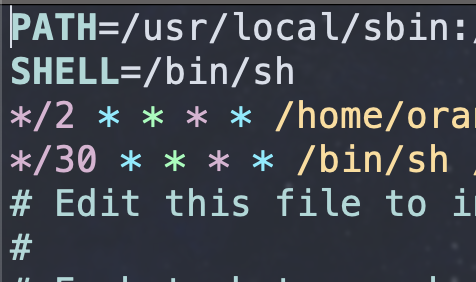
Cronjobs (quickly)
cronjobs, speedily
Cron is a cmdline utility used for scheduling commands or shell scripts to run periodically at fixed intervals.
Cron uses a configuration file called a crontab (cron table) that specifies shell commands to run.
Begin
Start by listing out any running cronjobs with crontab -l
Create a cronjob by running crontab -e.
Select your editor of choice.

At the top of the crontab file, insert your first cronjob.
Syntax:
$ [cron expression] [command/shell script]
$ minute hour day(month) month day(week) commandYou can use asterixes for the time fields to select every hour/minute/etc.
Cron examples:
- This runs a shell script located at an absolute path every five minutes.
*/5 * * * * /home/orangeburrito/Documents/scripts/script.sh Inside the aforementioned shell script:
#!/bin/sh
date "+Date: %D%nTime: %r" >> /home/orangeburrito/Documents/output.txt- This runs a command that outputs the current date to a file located at an absolute path, once a day at 6 AM.
0 6 * * * date "+Date: %D%nTime: %r" >> /home/orangeburrito/Documents/output.txtSave and edit the crontab file. Wait the alloted number of time specified in the cron expression and then check.
Learn more about cron schedule expressions here.
Note: Cron uses absolute paths. The location of the script file should be determined using
pwd
If running folder-specific commands inside your script file, navigate to that folder beforehand. e.g. running a compose script:
#!/bin/sh cd /path/to/folder docker-compose up -d
logs
By default cron jobs get logged to /var/log/syslog
You can see cronjobs there by running grep CRON /var/log/syslog
Cronjobs can be forced to log to a specific file like so:
*\5 * * * * /path/to/script.sh > /path/to/output.txt
etc
You can remove all cronjobs with crontab -r
To delete a singular cronjob, run crontab -e and remove the line containing that cronjob.
You can insert environment variables into the cron config file at the top.
For example:
PATH=/usr/local/sbin:/usr/local/bin:/usr/sbin:/usr/bin:/sbin:/bin:/usr/games:/usr/local/games:/snap/bin
/bin/sh
*/2 * * * * /home/orangeburrito/Documents/scripts/script.sh > /home/orangeburrito/Documents/cronlog.log